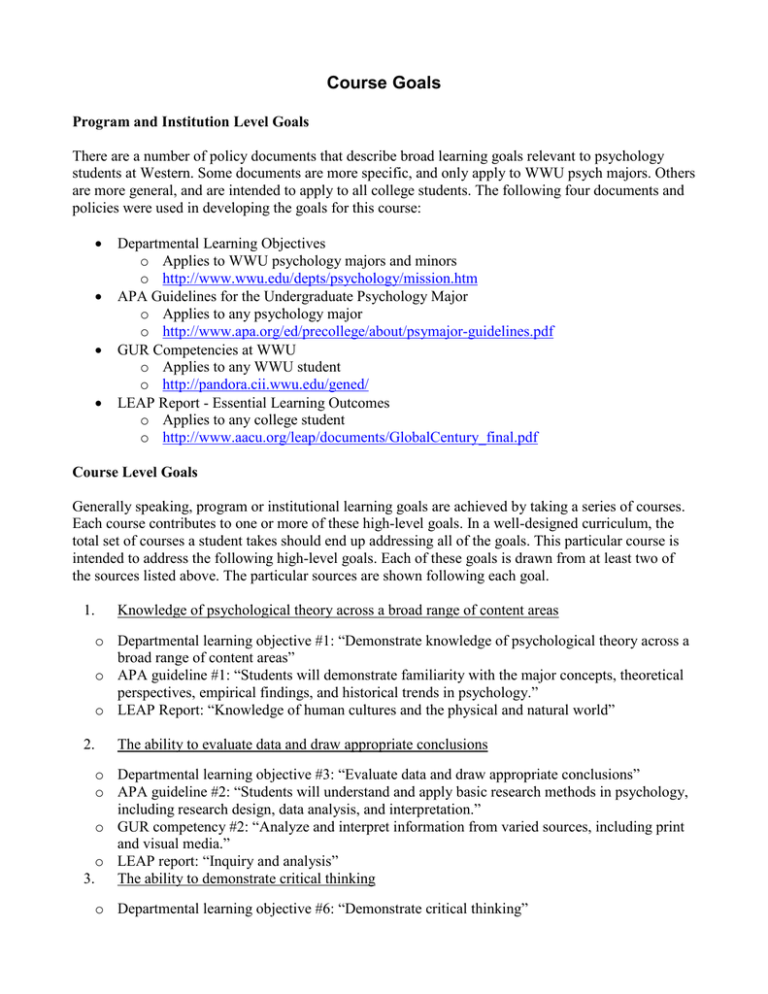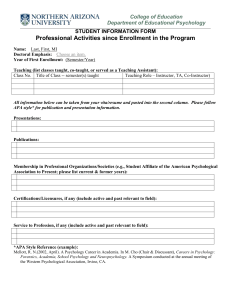This course introduces students to the study of Language as a
advertisement

Course Goals Program and Institution Level Goals There are a number of policy documents that describe broad learning goals relevant to psychology students at Western. Some documents are more specific, and only apply to WWU psych majors. Others are more general, and are intended to apply to all college students. The following four documents and policies were used in developing the goals for this course: • • • • Departmental Learning Objectives o Applies to WWU psychology majors and minors o http://www.wwu.edu/depts/psychology/mission.htm APA Guidelines for the Undergraduate Psychology Major o Applies to any psychology major o http://www.apa.org/ed/precollege/about/psymajor-guidelines.pdf GUR Competencies at WWU o Applies to any WWU student o http://pandora.cii.wwu.edu/gened/ LEAP Report - Essential Learning Outcomes o Applies to any college student o http://www.aacu.org/leap/documents/GlobalCentury_final.pdf Course Level Goals Generally speaking, program or institutional learning goals are achieved by taking a series of courses. Each course contributes to one or more of these high-level goals. In a well-designed curriculum, the total set of courses a student takes should end up addressing all of the goals. This particular course is intended to address the following high-level goals. Each of these goals is drawn from at least two of the sources listed above. The particular sources are shown following each goal. 1. Knowledge of psychological theory across a broad range of content areas o Departmental learning objective #1: “Demonstrate knowledge of psychological theory across a broad range of content areas” o APA guideline #1: “Students will demonstrate familiarity with the major concepts, theoretical perspectives, empirical findings, and historical trends in psychology.” o LEAP Report: “Knowledge of human cultures and the physical and natural world” 2. The ability to evaluate data and draw appropriate conclusions o Departmental learning objective #3: “Evaluate data and draw appropriate conclusions” o APA guideline #2: “Students will understand and apply basic research methods in psychology, including research design, data analysis, and interpretation.” o GUR competency #2: “Analyze and interpret information from varied sources, including print and visual media.” o LEAP report: “Inquiry and analysis” 3. The ability to demonstrate critical thinking o Departmental learning objective #6: “Demonstrate critical thinking” o APA guideline #3: “Students will respect and use critical and creative thinking, skeptical inquiry, and, when possible, the scientific approach to solve problems related to behavior and mental processes.” o LEAP report: “Critical and creative thinking” 4. The ability to work collaboratively to complete a project o GUR competency #9: “Work collaboratively and manage projects to effective completion.” o LEAP report: “Teamwork and problem solving” Specific Skills In order to be useful in a particular course, high-level goals need to be translated into more specific terms. For example, the ability to communicate effectively would mean quite different things in a class on molecular biology and a class on medieval European history. It would also mean quite different things at different points in the curriculum, for example in intro psych versus a senior seminar. For each of the general goals above, there are several specific skills which indicate what that goal is going to look like in this course. These are shown in the tables below. General Goal 1: Knowledge of psychological theory across a broad range of content areas Specific Skills a. Understand major theories and concepts for the subdomains of cognition, including perception, attention, memory, language, reasoning, and problem solving b. Understand overarching themes in the field, including box-and-arrow diagrams, top-down versus bottom-up processing, and heuristics versus algorithms c. Understand how cognition relates to other major areas in psychology, including developmental psychology, social psychology, abnormal psychology, and neuroscience General Goal 2: The ability to evaluate data and draw appropriate conclusions Specific Skills a. Understand data presented in the form of tables and graphs b. Use data to distinguish between different theories c. Use a theory to generate predictions General Goal 3: The ability to demonstrate critical thinking Specific Skills a. Distinguish between correlation and causation b. Recognize the difference between internal and external validity c. Critically evaluate claims presented in the media General Goal 4: The ability to work collaboratively to complete a project Specific Skills a. Exhibit professionalism in interactions with peers b. Share information and ideas with a group c. Work cooperatively to complete tasks


